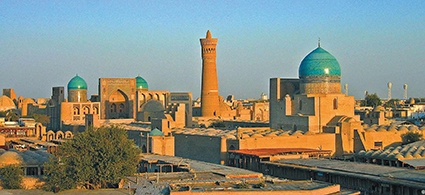Assessing the Russian Power across the Post-Soviet Space, Part II: Uzbekistan
It has been in Russia’s core interests to have Uzbekistan as a close partner, as the country arguably has the most strategic location in the region. Uzbekistan shares borders with all Central Asian states (Kazakhstan, Kyrgyzstan, Tajikistan and Turkmenistan) and Afghanistan, and also sits on a big part of the agriculturally rich Fergana Valley, with a sizable population as well as oil and natural gas deposits. This has resulted in, at times, difficult relations between Tashkent and Moscow since the break-up of the Soviet Union. Yet, its strategic location as well as large resources have enabled Uzbekistan to always successfully resist Russian pressure to enlist Tashkent into CSTO or the EEU.
Despite foreign policy issues with Moscow, Uzbekistan’s long time president Karimov, in his 26-year reign, managed to leave the CSTO in 2012 after four years as a member. Although Karimov has notoriously bad relations with almost all his neighbors, it was under his rule that the foundation of Uzbekistan’s non-alignment policy was laid.
This largely conditioned Russia’s behavior towards Uzbekistan, and Moscow has big economic interests in the country. As a reflection of this, in early April 2017, Uzbek and Russian companies signed 16 $3.5 billion-worth agreements and when the Uzbek president visited Russia, another $12 billion-worth of projects was signed. Further, a new five-year natural gas contract was signed between the countries. Russian and Uzbek delegations also reached an interesting agreement on facilitating Uzbek labor migrants’ stay in Russia. Perhaps somewhat related to this, later in May, the Russian ministry of internal affairs announced it would open an office in Uzbekistan to better control the flow of migrants into Russia.
Russia is also interested in taming radical Islamism and its followers, which are often recruited from Central Asian workers visiting Russia. Among the Central Asian states, Uzbekistan has been notorious as there were several examples of Uzbeks involved in terror attacks across Europe, including the one in the St. Petersburg subway this year.
Beyond grassroots terrorism, on a wider geopolitical level, Russia is worried that the Central Asian region could be engulfed by instability. This prompts Moscow to seek better relations with Uzbekistan, including closer military and security contacts, as the country borders on volatile Afghanistan. Perhaps a good reflection of this geopolitical imperative is the first military exercises (which started from October 3rd in Forish training facility, about 250 km southeast of Tashkent) since 2005 between the two countries.
Chinese moves
Although Uzbekistan has its own economic and military potential to remain non-aligned and to withstand Russian pressure, there is another player, China, which not only balances Russia, but also wants to increase its own influence over Uzbekistan. To Beijing, Uzbekistan represents a centerpiece of its Central Asian policy. Here again, as in the case of Russia, Uzbekistan’s geographic position and the country’s rich gas and agricultural resources play a big role. Moreover, when China unveiled its ambitious BRI in 2013, Uzbekistan was noted as an important element in one of the corridors which would connect China with the neighboring sub-regions.
Chinese politicians are clever enough not to position themselves as opposing Russian influence in Uzbekistan. Indeed, an overview of Chinese analytical reports on the BRI and statements by Chinese officials show that Beijing is more concerned with other powers such as Japan, India or the US which could challenge the project in Central Asia. In comparison, the Chinese are less inclined to think of Russian opposition to the BRI in Central Asia, and Uzbekistan in particular. Indeed, Moscow has not expressed any worries over growing Chinese activities in the region and Putin himself endorsed the BRI in his statements. However, there are reasons for the Kremlin to be worried in the longer term as China has already surpassed Russia in becoming Uzbekistan’s primary economic partner and investment source. For instance, this May, Uzbekistan signed $20 billion-worth of agreements with China, dwarfing the Russian moves mentioned above.
China, like Russia, is also worried about the potential instability in Central Asia and the spill-over into Xinjiang (a restive Chinese province populated with Muslim Uighurs). Here again, military and security cooperation with Uzbekistan would serve Beijing’s interests, but Uzbekistan so far has been careful not to entangle itself in any Chinese security initiatives as this would negate the notion of Tashkent’s non-alignment policy.
Overall, even though China frames its BRI and the ensuing economic projects in Uzbekistan not as a competition with Russia or other regional powers, but simply as a possibility to better reconnect the Central Asian region, still some geopolitical questions remain. How long will Moscow react as its economic clout recedes? Bearing in mind the economic potential of BRI, the fundamental weaknesses of the Eurasian Economic Union, what will Tashkent choose in the pursuit of economic growth?
It is likely that Russia and China will pursue closer economic and security ties with Uzbekistan, as both powers remain concerned with transnational terrorism, potential US encroachment, and Islamist recruitment. Nevertheless, Uzbekistan is unlikely to make radical moves towards rejoining CSTO or the EEU, or siding with Beijing. Tashkent will continue unbound by alliances, giving it more leverage and a freer hand in its foreign policy.
Emil Avdaliani












